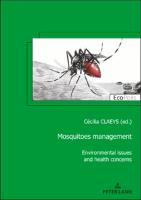Mosquitoes management
Between environmental and health issues
Contributor(s)
Claeys, Cécilia (editor)
Language
EnglishAbstract
This edited volume focuses on contemporary developments in mosquito control policies. It is premised on the idea that, in view of the social and ecological changes of recent decades, effective management of vector mosquitoes calls for a break with the old North/South, environment/health dualisms. Increasing urbanization and climate change encourage the proliferation of vector mosquitoes and expand their range of distribution. Globalization and the accelerated flow of human beings, insect vectors and viruses are increasing epidemic risks. In the North, populations are now exposed to emerging or re-emerging epidemic risks (dengue fever, chikungunya, zika, malaria, etc.). However, comfort-based mosquito control techniques designed predominantly to reduce a nuisance have proven ineffective against vector mosquitoes. In the South, social acceptance of large-scale insecticide spraying is waning. Ecological concerns are voiced with growing insistence, denouncing a cure that can be worse than the disease. Reliance on chemical control appears even less desirable as its effectiveness declines due to increasing insecticide resistance among mosquitoes. Meanwhile, genetic engineering is still in the trial and error phase and raises new ethical questions. The changes studied here are socio-environmental. To understand them, this volume proposes a dialogue between sociology, geography, entomology, epidemiology and ecology based on several study areas in Africa, the Indian Ocean, America and Europe. These analyses show that the relationships between human societies and mosquitoes are more deeply enmeshed than ever, as if caught in a duel that is still all too often fatal.
Keywords
Cécilia; Claeys; environmental; health; issues; management; Marc; Mormont; MosquitoesDOI
10.3726/b15130ISBN
9782807602427, 9782807602434, 9782807602441, 9782807602410, 9782807602427Publisher website
https://www.peterlang.com/Publication date and place
Bern, 2019Series
EcoPolis, 31Classification
Environmentalist, conservationist and Green organizations
Rural communities
Sociology: death and dying
Conservation of the environment


 Download
Download Web Shop
Web Shop